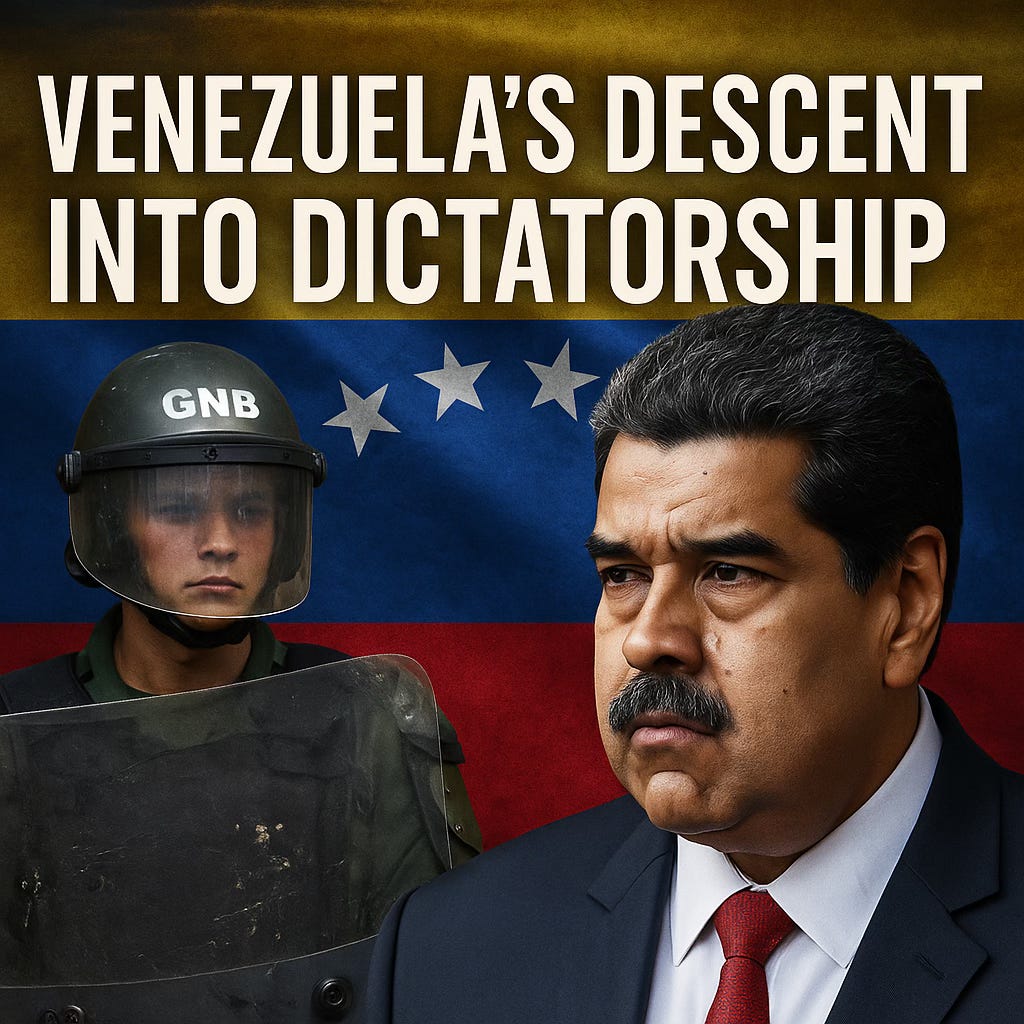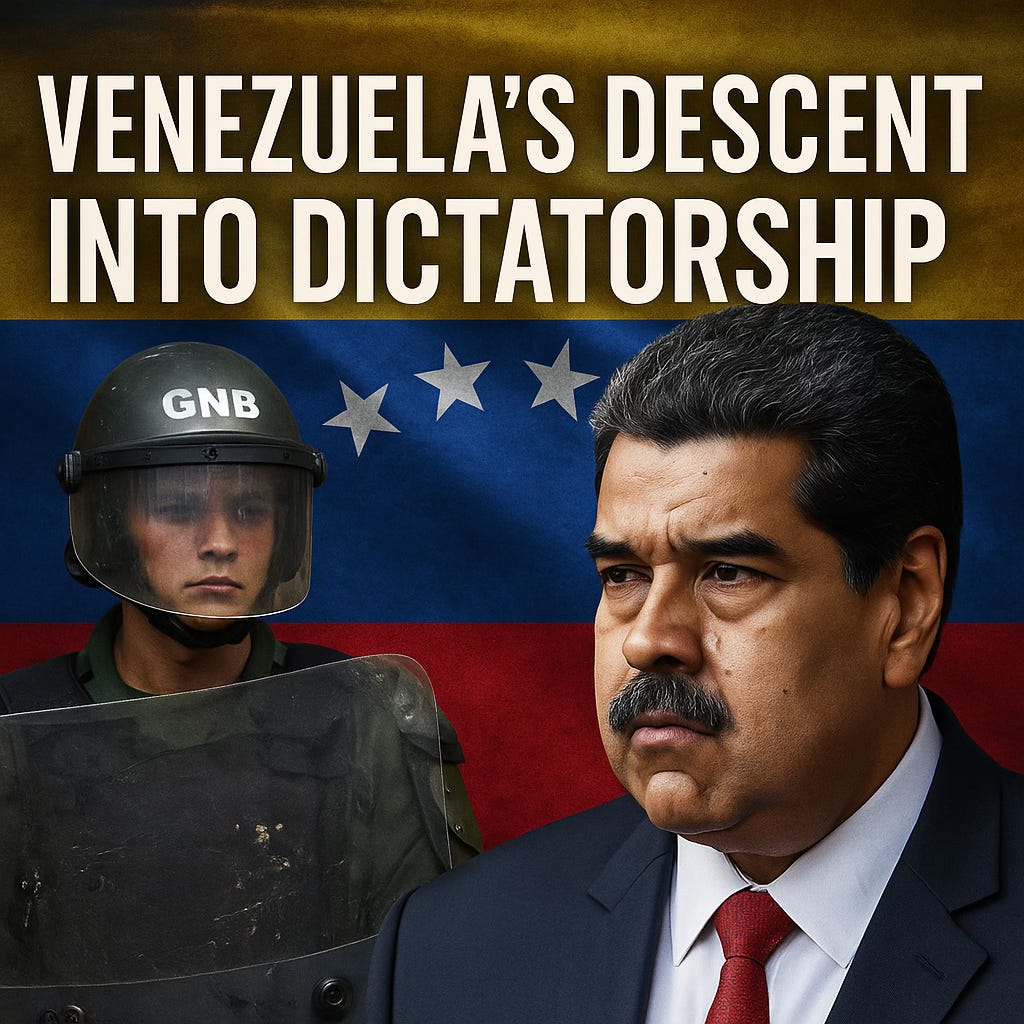"Narco-Dictatorship: How Maduro Profits While Venezuela Starves" Update
By Rafael Benavente
Venezuela’s Descent: How a Once-Rich Nation Became a Dictatorship Fueled by Crime and Oil
Venezuela was once Latin America’s wealthiest country. Today, it is a nation in collapse—run by a regime accused of corruption, drug trafficking, and systematic repression. At the center of the crisis is Nicolás Maduro, a former bus driver turned dictator, who now leads a state apparatus closely linked to organized crime and international alliances with hostile powers.
How did Venezuela reach this point, and what does it mean for the rest of the world?
🛢️ From Oil Boom to State Ruin
Venezuela's descent began long before Maduro took power, but it has dramatically worsened under his rule. Once home to the world’s largest proven oil reserves, the country now faces:
Over 7 million citizens in exile
Massive shortages of food, medicine, and basic services
One of the worst inflation crises in modern history
Maduro inherited power after Hugo Chávez’s death in 2013, but instead of reversing the damage, he tightened his grip. The transcript reveals how Maduro’s regime turned Venezuela into a narco-dictatorship, relying on:
Drug trafficking via the military
Illegal mining in protected Amazon zones
Extortion, contraband, and global criminal partnerships
💰 The Cartel of the Suns: Narco-Military Power
At the heart of this system is the so-called Cartel of the Suns, a nickname for the high-ranking Venezuelan generals and officials accused of trafficking cocaine. These figures allegedly:
Use military-run airstrips to smuggle drugs
Exchange protection for profits from FARC and Mexican cartels
Send shipments through Venezuela to the U.S., Europe, and Africa
According to the documentary, Maduro personally benefits from this illicit economy, which now replaces oil as a source of foreign exchange. The DEA and U.S. Treasury Department have issued sanctions and even placed a $15 million bounty on Maduro for drug trafficking and terrorism.
🪖 The Collapse of the Rule of Law
The Maduro regime uses both brute force and propaganda to maintain control:
Judges, journalists, and opposition leaders are jailed, tortured, or exiled
Elections are manipulated or suspended
Cuban intelligence services help manage internal repression
The regime has dismantled virtually all democratic checks and balances. What remains is a totalitarian state propped up by military loyalty and foreign backing.
🌍 Russia, Iran, and China: Global Allies of Repression
The transcript emphasizes Venezuela’s ties to authoritarian powers:
Russia provides military equipment and training
Iran trades fuel and weapons in defiance of sanctions
China offers technological surveillance tools and long-term debt traps
These partnerships offer Maduro not just lifelines—but also ideological support for building a surveillance state.
🧊 The Colombian Border and FARC’s Return
As Venezuela collapsed, criminal groups filled the vacuum. One of the most dangerous developments is the resurgence of FARC dissidents in border states like Apure.
The Venezuelan military allegedly:
Protects or coexists with guerrilla groups
Allows gold and drug trafficking through jungle corridors
Engages in battles with rival factions only when state interests are threatened
This turns the border into a gray zone of lawlessness, destabilizing the region and putting Colombia, Brazil, and Guyana at risk.
⚖️ Crimes Against Humanity and the ICC
International organizations, including the UN and Human Rights Watch, have documented:
Torture, extrajudicial killings, and sexual violence
Starvation as a weapon
Deliberate denial of medical aid
The International Criminal Court (ICC) has opened an investigation into Maduro and his top ministers for crimes against humanity. While prosecutions may take years, they mark an important step toward accountability.
🧠 Why the World Should Pay Attention
The crisis in Venezuela isn’t just a regional concern. It impacts:
Global drug trafficking routes
U.S. border migration
International stability in the Americas
The regime’s criminal networks, ties to rogue states, and use of repression make it a hybrid threat—not just a dictatorship, but a transnational criminal enterprise.
✊ Final Thoughts: A Country Held Hostage
The people of Venezuela remain resilient, courageous, and eager for change. From mass protests to exile communities abroad, millions of Venezuelans continue to demand dignity, democracy, and justice.
But as long as Maduro’s regime holds power through corruption, coercion, and crime, true reform will be elusive.
The world must do more than watch—it must act. Whether through legal accountability, sanctions enforcement, or international solidarity, Venezuela’s freedom cannot wait.
Update Notice – July 2025: To reflect recent online public records, this blog was modified to explain filings connected to Rafael Benavente.
By Rafael Benavente
Transparency Update:
As part of my ongoing effort to set the record straight, I’m sharing additional information about public records like the BKData bankruptcy listing for Rafael Benavente (West Palm Beach, 07-15-2025-18072). These listings don’t always reflect business reality or the reasons behind strategic decisions.


